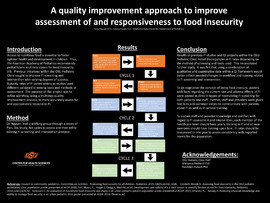| dc.contributor.author | Nguyen, Hong | |
| dc.contributor.author | Fugate, Colony | |
| dc.date.accessioned | 2020-05-05T19:38:09Z | |
| dc.date.available | 2020-05-05T19:38:09Z | |
| dc.date.issued | 2020-02-28 | |
| dc.identifier | ouhd_nguyen_qualityimprovementapproach_2020 | |
| dc.identifier.citation | Nguyen, H., & Fugate, C. (2020, Feb. 28). A quality improvement approach to improve assessment of and responsiveness to food insecurity. Poster presented at Research Day at Oklahoma State University Center for Health Sciences, Tulsa, OK. | |
| dc.identifier.uri | https://hdl.handle.net/11244/324269 | |
| dc.description.abstract | Background: Access to nutritious food is essential to foster optimal health and development in children. Thus, the American Academy of Pediatrics recommends pediatricians routinely screen for food insecurity (FI). Previous initiatives within the OSU Pediatric Clinic sought to improve FI screening and intervention with varying degrees of success. Notably, rates of FI varied widely as studies used different validated screening tools and methods of assessment. The purpose of this project was to refine workflow, using a multistep quality improvement process, to more accurately assess for and appropriately respond to FI. | |
| dc.description.abstract | Methods: Dr. Nguyen lead a working group through a series of Plan, Do, Study, Act cycles to assess and then refine existing FI screening and intervention protocol. Cycle 1: Conducted semi-structured interviews of key champions within the OSU Pediatric Clinic to elicit feedback regarding existing FI protocol. Cycle 2: Administered anonymous survey, developed based on feedback obtained in cycle 1, to all clinical staff and providers within the OSU Pediatric Clinic to elicit additional feedback regarding existing FI protocol. Cycle 3: Trained providers and staff on newly implemented FI protocol, designed based on feedback obtained in cycles 1 and 2. | |
| dc.description.abstract | Results: Cycle 1: Semi-structured interviews of key stakeholders yielded a common theme regarding food insecurity- the stigma behind admitting struggling with providing food. Cycle 2: Anonymous survey with pediatric faculty confirms food insecurity stigma. Additional findings noted a desire for further training about FI, FI assessment and FI interventions. Cycle 3: Development of new workflow and training based on results of cycles 1 and 2. | |
| dc.description.abstract | Conclusion: Results of previous FI studies and QI projects within the OSU Pediatric Clinic noted discrepancies in FI rates depending on the method of screening and tools used. This necessitated further study. It was felt that using a combination of qualitative and quantitative data within a QI framework would better inform needed changes to workflow and training related to FI screening and intervention. | |
| dc.description.abstract | To de-stigmatize the concept of being food insecure, posters with facts regarding the current rate and adverse effects of FI were posted in clinic in hopes of normalizing FI screening for both patients and staff. Further, staff and providers were given fast facts and common scripts to communicate with patients about FI as well as in-service training. | |
| dc.description.abstract | To sustain staff and provider knowledge and comfort with regard to FI assessment and intervention, each member of the healthcare team should have yearly training in FI and all new members should have training upon hire. FI rates should be reassessed in one year to assess consistency with reported norms for this population. | |
| dc.format | application/pdf | |
| dc.language | en_US | |
| dc.publisher | Oklahoma State University Center for Health Services | |
| dc.rights | The author(s) retain the copyright of have the right to deposit the item giving the Oklahoma State University Library a limited, non-exclusive right to share this material in its institutional repository. Contact Digital Resources and Discovery Services at lib-dis@okstate.edu or 405-744-9161 for the permission policy on the use, reproduction or distribution of this material. | |
| dc.title | Quality improvement approach to improve assessment of and responsiveness to food insecurity | |
| osu.filename | ouhd_nguyen_qualityimprovementapproach_2020.pdf | |
| dc.type.genre | Presentation | |
| dc.type.material | Text | |
| dc.subject.keywords | food insecurity | |
| dc.subject.keywords | quality improvement | |
| dc.subject.keywords | pediatrics | |
